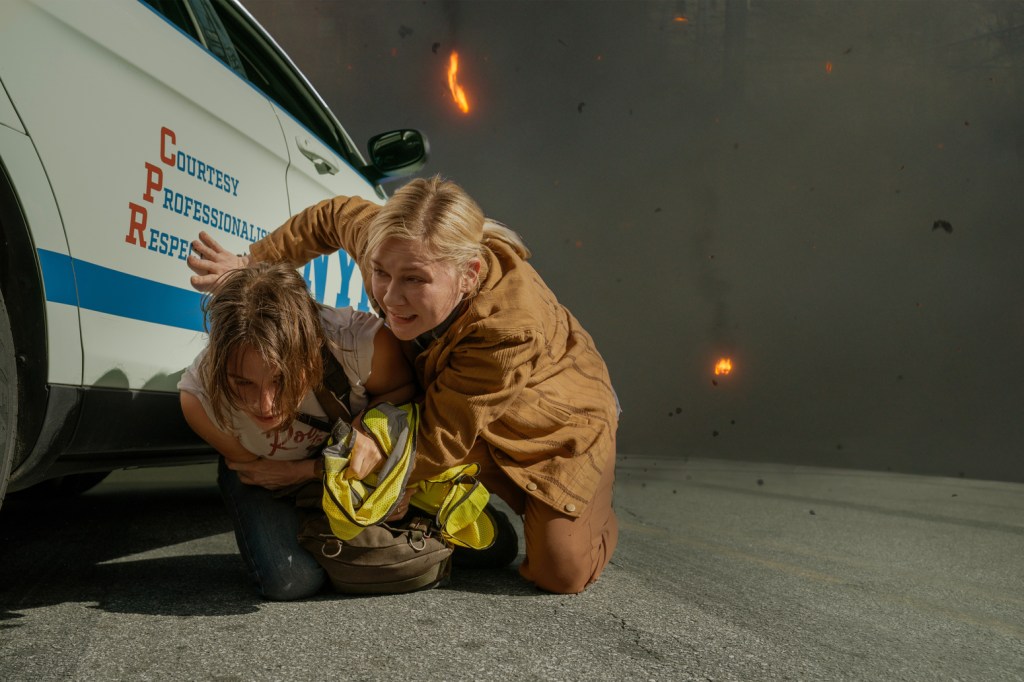Alex Garland’s new movie is a fascinating little thing. Civil War comes to us from the director of Ex Machina, Annihilation, and Men. He has had a strong career, and this movie marks one of A24’s first big-budget films. $50 million went to the production of their most expensive film to date, and it had a positive reception at its SXSW premiere. This dystopian thriller follows a group of photojournalists making their way through a wartorn American landscape to interview the President of the United States.
My experience watching Civil War was something to behold. I adored it for the first 70% of the movie. And then, as the film drove headfirst towards its dreary conclusion, it lost me more and more by the second. Then, as the credits rolled, I felt nothing. No connection to the material. No pondering about the state of America. I was unperturbed. It’s unfortunate because for so much of the movie, I thought it was very good, but the final act brought everything crashing down to the point where I lost interest in everything the movie was building up.
The opening brings a lot of real-world archival footage into the film, recontextualizing it to show the start of a new American Civil War in a not-so-distant future. He builds a world that feels both familiar and unfamiliar, combining the texture of New York City with some more desolate, ravaged landscapes later in the film. We see brawls between protesters and law enforcement and many things that exist in our reality. The main characters we follow do not align themselves with the Loyalists, Western Forces, Florida Alliance, or New People’s Army, which are the four factions the USA has been divided into in this film.
Rather, we follow a group of photojournalists. The protagonist is Lee Smith (Kirsten Dunst), a hardened journalist who has become well-known in the industry. Through a few flashbacks, we get a sense of her world. She has seen truly horrific images, and since this movie is from her perspective, we have to see what she does. And because we’re trapped in the audience, we can’t do anything about it either. It’s a fantastic way of forcing us into her shoes as we watch horrible things happen, but Lee’s job is not to interfere—she can only document it.
We follow a few characters through the film. We have Lee’s colleague Joel (Wagner Moura), who I felt was the least interesting of the bunch. Moura’s giving a fine performance, but the character has very little on the page. His relationship with the other characters is less investing than everything else. There’s Sammy (Stephen McKinley Henderson), who provides a likable presence to the entire movie. He’s an easy character to root for while also being scared for him because he’s an older veteran journalist in a dangerous landscape.
The key emotional core is the relationship between Lee and a younger journalist named Jessie (Cailee Spaeny). In a lot of ways, Jessie reflects a younger version of Lee. Jessie is wide-eyed and idealistic and not as seasoned as Lee. Civil War is meant to be a story of becoming for Jessie and how she becomes a more current version of Lee with a similar worldview. That idea works phenomenally for the most part, but the final act brings us to that endpoint too fast. The actions Lee and Jessie perform during the final moments of the film feel like a betrayal of both their characters. By the end of it, it feels more stupid than tragic.
Civil War starts out as a particularly strong film. We have excellent performances, particularly from Dunst, who hasn’t been in as many mainstream movies in recent years. However, her talent really shines as she gives a grounded, believable performance. Spaeny is also fantastic in her role, which contrasts with the beautifully bleak existence that permeates this movie. There are a few stylish choices throughout with the music. One moment uses Christmas music and is excellent for the atmosphere. Another uses a song that doesn’t match the visuals at all, and it took me out of the experience.
Sometimes, the movie can feel a little too subdued, but when the film shows graphic violence, it works very well. There are a few pieces of imagery that will stick with me for a while. One particular scene that features an appearance from Jesse Plemons is harrowing and easily the darkest, most horrifying sequence in the movie. But then, we have our finale. Although some have described this as an action movie, we don’t really have a real action set piece until the finale. This is where the movie crashes and burns. The goal the characters have been striving towards is largely forgotten about in exchange for a big shootout.
But this shootout isn’t interesting because of Garland’s commitment to remaining objective. He doesn’t want to take a side with this movie, and he seems uninterested in any powerful messaging. What’s the message here? Is it that power-hungry governments are bad? This is very surface-level. We get a sense that the U.S. government is now dictatorial, with the president (Nick Offerman) serving a third term, airstrikes being sent on American civilians, and journalists said to be shot on sight at the Capitol. But we don’t see much of this; it’s only mentioned. If we don’t see this happen, the danger doesn’t work. The Battle of Yavin in the original Star Wars movie would not have been as scary if we hadn’t seen the Death Star blow up a planet earlier.
So we get to this finale that has a lot of shootouts and gunfire and explosions. But this is not interesting to watch because we’re just watching a bunch of soldiers shoot at each other. It’s not clear who the good guys or bad guys are. You can argue that that’s the point, that there aren’t any good guys or bad guys in this narrative. However, if we’re stuck watching a bunch of people shoot guns and we don’t care about a single character, it doesn’t make for a good viewing experience. We’re not rooting for anyone. We don’t know what the stakes are because there’s no ticking clock. There are no cool or memorable moments in the action. It’s just a big blur of violence.
We’re mainly watching the journalists, who have to stay close to the action and avoid getting killed. But because the main characters are journalists who don’t interfere in anything that happens, they become extremely passive characters. They’re not active because they’re just spectators in the action. Imagine a sports movie where it doesn’t end with the protagonist hitting the game-winning shot; instead, it ends with the protagonist watching a sports game from the bleachers, not knowing any of the players. The characters are part of the action for sure, but they’re not doing anything meaningful because they’re supposed to stay out of it as journalists. They need to capture an objective point of view but save for one moment, the characters do not get pushed to any new emotional places in the action.
Civil War’s biggest act of cowardice is not doing anything to get you invested. The circumstances of the war were very vague, and as much as I wanted to be excited and thrilled by the final act, I didn’t know what to root for. I wanted the characters to have strong beliefs and then have those beliefs challenged by the horrors of what they saw. I wanted to feel justice and injustice, but when the characters are reacting with no emotion, an audience can barely respond with much emotion either. The biggest emotional moment in the film happens before the final act, but I predicted this story beat very early on in the film, so it rang hollow for me.
Ultimately, Alex Garland’s Civil War features some of the most impressive, tense filmmaking of the year and then makes a few baffling choices that knock it far, far back.
SCORE: 5/10
As ComingSoon’s review policy explains, a score of 5 equates to “Mediocre.” The positives and negatives wind up negating each other, making it a wash.
Disclosure: ComingSoon attended a press screening for our Civil War review.













